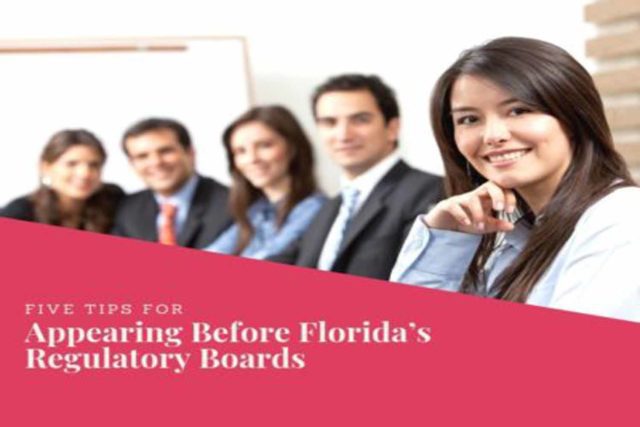How does Florida regulate and authorize licenses?
A “license” to regulate professions and occupations means any permit, registration, certificate, or license issued in Florida. An occupational license is a privilege accorded by the state or its subdivisions to conduct a business at a particular location and is not a property right protected by substantive due process; the denial of such license does not prevent the business owner from pursuing a lawful occupation but merely stops the business from operating at a particular location. Ammons v. Okeechobee County, 710 So. 2d 641 (Fla. 4th DCA 1998).
On July 1, 2021, the Florida Legislature passed Section 163.211 into law, which prevents any county, municipality, or other political subdivision of Florida from implementing additional licensing requirements for most occupations. Therefore, a prospective applicant only needs to satisfy state statutory requirements.
Need help receiving, renewing, or defending your license? Schedule your consultation today with a top administrative law and licensing attorney.
Which laws and regulations apply to Florida labor organization licenses?
In Florida, labor organization licenses derive from the Florida Public Employee Relations Commission (PERC). PERC oversees labor relations between public employers, employees, and their respective employee organizations.
The primary statutes governing labor organization licenses are in Chapter 447 of the Florida Statutes, specifically Part II, which covers labor organizations and collective bargaining rights for public employees. Moreover, Florida Administrative Code Rule 60CC provides additional regulations and procedures for labor organizations.
In addition to state laws and regulations, federal laws also apply to labor organizations in Florida. For example, the National Labor Relations Act (NLRA) is a crucial federal statute that governs private-sector labor relations and grants employees the right to form and join labor organizations. Furthermore, the Labor-Management Reporting and Disclosure Act (LMRDA) imposes reporting requirements on labor organizations to ensure transparency and financial accountability.
Furthermore, the Code of Federal Regulations (29 CFR Part 451) guides labor organization definitions and standards for determining whether an organization qualifies as a labor organization under federal law.
What are the application and retention requirements for labor organization licenses in Florida?
Application Requirements:
According to Section 447.305, Florida Statutes, an employee organization seeking to register as a labor organization must:
- File a registration statement with PERC containing the organization’s name, address, and a description of the bargaining unit represented or sought to be represented.
- Attach a copy of the organization’s constitution and bylaws.
- Provide a statement of the organization’s financial condition, including a balance sheet and an operating statement for the preceding fiscal year.
- Include a statement identifying each officer and their address.
- Submit a statement affirming that the organization has no officers or representatives subject to conflicts of interest.
Retention Requirements:
To maintain their labor organization license, organizations must comply with ongoing requirements, including the following:
- File an annual financial report with PERC.
- Adhere to the reporting requirements under the LMRDA for financial transparency and accountability.
- Remain in compliance with all applicable federal and state laws and regulations to ensure the validity of their labor organization license.
To determine whether you meet the requirements for a labor organization license, please contact our office to set up your initial consultation.
Can the PERC’s license decision be appealed?
Yes, an adverse license decision made by the PERC is appealable. The authority for appealing such decisions comes from the Florida Administrative Procedure Act (APA), Chapter 120 of the Florida Statutes. Specifically, the right to appeal derives from Florida Statutes §120.569 and §120.57. The APA establishes the framework for challenging agency actions, such as licensing decisions, through administrative hearings and judicial review.
If an applicant or licensee receives an adverse decision from the PERC, they may request an administrative hearing to challenge it. The request for a hearing must be submitted within the timeframe specified in the agency’s notice, which is generally 15 days from the date of the notice, as provided in Section 120.569(2)(a), Florida Statutes.
The administrative hearing process commences with submitting a petition for a hearing to the agency. The petition must comply with the requirements outlined in Rule 28-106.201, Florida Administrative Code. If the petitioner qualifies for an administrative hearing, the case is referred to the Division of Administrative Hearings (DOAH) and assigned to an administrative law judge (ALJ).
The ALJ conducts the hearing, like a trial, with both parties presenting evidence and testimony. After the hearing, the ALJ issues a recommended order, which includes findings of fact, conclusions of law, and a recommendation for a final decision. The PERC then reviews the recommended order and issues a final order, either adopting, modifying, or rejecting the ALJ’s recommendations.
Suppose the petitioner is unsatisfied with the PERC’s final order. In that case, they can seek judicial review by filing a notice of appeal with the appropriate District Court of Appeal, as provided in Section 120.68, Florida Statutes. The court reviews the case to determine if the agency’s decision follows from competent, substantial evidence and complies with the law.
Have more questions about a professional licensing-related situation?
Crucially, this overview of labor organization licenses does not begin to cover all the laws implicated by this issue or the factors that may compel the application of such laws. Every case is unique, and the laws can produce different outcomes depending on the individual circumstances.
Jimerson Birr attorneys guide our clients to help make informed decisions while ensuring their rights are respected and protected. Our lawyers are highly trained and experienced in the nuances of the law, so they can accurately interpret statutes and case law and holistically prepare individuals or companies for their legal endeavors. Through this intense personal investment and advocacy, our lawyers will help resolve the issue’s complicated legal problems efficiently and effectively.
Having a Jimerson Birr attorney on your side means securing a team of seasoned, multi-dimensional, cross-functional legal professionals. Whether it is a transaction, an operational issue, a regulatory challenge, or a contested legal predicament that may require court intervention, we remain a tireless advocate every step of the way. Being a value-added law firm means putting the client at the forefront of everything we do. We use our experience to help our clients navigate even the most complex problems and come out the other side triumphant.
If you want to understand your case, the merits of your claim or defense, potential monetary awards, or the amount of exposure you face, you should speak with a qualified Jimerson Birr lawyer. Our experienced team of attorneys is here to help. Call Jimerson Birr at (904) 389-0050 or use the contact form to set up a consultation.

We live by our 7 Superior Service Commitments
- Conferring Client-Defined Value
- Efficient and Cost-Effective
- Accessibility
- Delivering an Experience While Delivering Results
- Meaningful and Enduring Partnership
- Exceptional Communication Based Upon Listening
- Accountability to Goals











